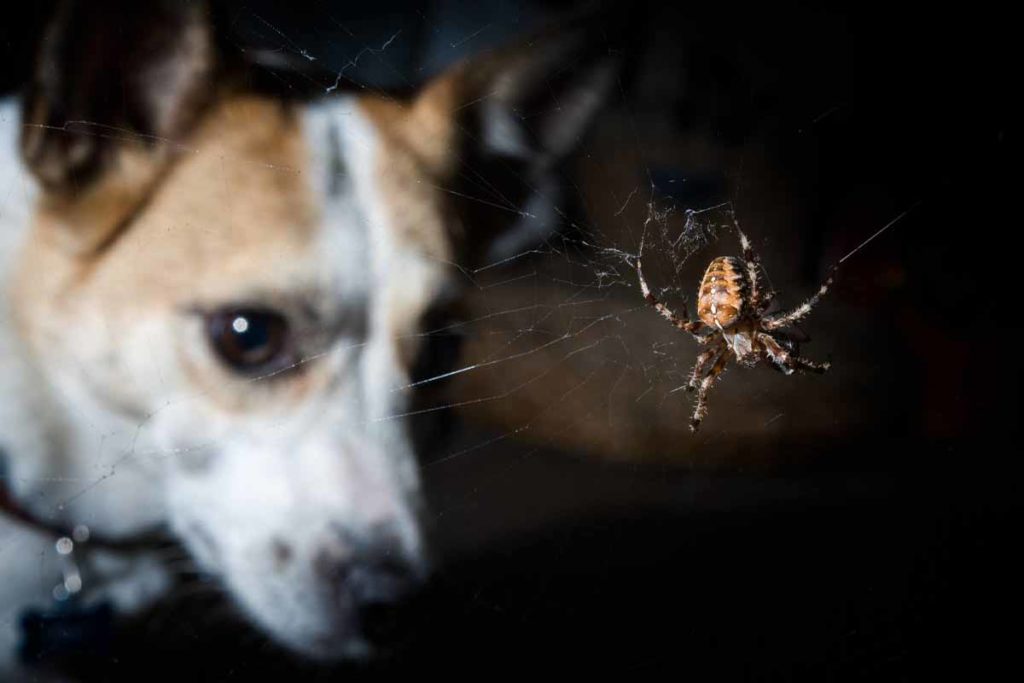As warmer weather settles in and so many of us plan to spend more time outside enjoying the fresh air with our pups, we’re also preparing for fleas, ticks, and other insects. According to veterinary experts at VCA Animal Hospitals, while most spiders aren’t able to deliver enough venom to an animal or human to be considered dangerous, there are a couple of spiders to keep an eye out for. Which spiders pose a serious threat to our canine companions? What should pet parents be on the lookout for and what should you do if your pup gets a spider bite?
Table of Contents
- Dangerous spider species
- Signs of spider bites
- How are spider bites treated?
- How can I prevent my dog from getting spider bites?
Dangerous spider species
In the United States, there are two predominant types of spiders that can pose a serious threat to dogs: widow spiders (particularly Black Widows) and recluse spiders (especially Brown Recluses). As noted earlier, the vast majority of spider species throughout the world are indeed venomous but cannot cause harm to large mammals such as people and their pets. However, the Merk Veterinary Manual notes that the mouth parts of Black Widow and Brown Recluse spiders are of sufficient size to allow penetration of the skin and deliver sufficient quantities and or potencies of toxin to result in severe harm.
Black Widow
There are five species of widow spiders, or Latrodectus, in the U.S., the most common being the Black Widow. These spiders are typically found in tropical and temperate environments throughout the world. In the U.S., Black Widows generally live in the south and west regions of the country but can be found in all 50 states. They tend to live in warm, dark, secluded places—quiet corners of the basement, attic, or garden shed are perfect for these pests.
Female Black Widow spiders are often significantly larger in size than their male counterparts, as well as more venomous. These arachnids can be identified by their dark grey or black bodies with a red or orange hourglass marking on their abdomen. Immature female Black Widows do not always have this bright marking yet but are still considered venomous.
Brown Recluse
Recluse spiders, or Loxosceles, can also cause harm to your furry friend. While the most common recluse is the Brown Recluse, there are six different species of these spiders found in the U.S. They can be found worldwide and throughout the U.S., but they are largely concentrated in southern parts of the Midwest.
Similar to the Black Widow, Brown Recluses prefer dark, warm hiding places in locations like closets, where they can live undisturbed. Female recluses are also the larger and more venomous of the two recluse sexes. They can be identified by their yellow-brown color and often have a violin-shaped marking on their back.
As the name suggests, recluse spiders are generally reclusive and not considered aggressive. They can bite when they feel threatened, however, so incidents of dogs getting bitten by recluses often occur when a pup accidentally lays down on top of one of these spiders or invades their living space, according to VCA Animal Hospitals.
Signs of spider bites
Insect bites aren’t fun. Clinical signs that your dog has been bitten by a spider vary widely depending on what species of spider delivered the bite and can range from a simple red bump to vomiting and muscle spasms. The Merk Veterinary Manual points out that most spider bites do not look all that different than other insect bites, and because widow and recluse spider bites do not tend to be particularly painful, it is unusual for a bite to be suspected until clinical signs appear.
According to the American Pet Hospital, while some spider bites can produce serious symptoms that require urgent professional care, the vast majority of bites cause little more than slight irritation and are generally harmless. Minor symptoms of a spider bite can include mild irritation, itchiness, swelling, and redness. The caveat, however, is that it is possible for dogs to have allergic reactions to spider bites, in which case the pup may break out in hives and develop excessive swelling. The good news is that life-threatening spider bites are rare.
Black Widow bites
According to VCA, physical signs of a Black Widow bite can be observed in dogs within a few minutes to up to eight hours from the time at which the bite was delivered. The bite itself is typically considered moderately painful and it is often accompanied by redness and or swelling. From the outset, a dog bitten by a Black Widow will likely display some physical signs of discomfort.
Black Widow spider venom contains a neurotoxin (alpha-latrotoxin) that causes massive excitation of neurons, leading to muscle tremors and other effects, according to VCA. Veterinary experts at VCA also note that the number of Black Widow bite patients who develop severe symptoms is low. These more significant signs can include:
- Muscle pain, rigidity, cramping, tremors, and even paralysis
- “Drunk walking”
- Vomiting
- Diarrhea
- Drooling
- Hypertension
- Respiratory distress
Symptoms of a Black Widow spider bite may wax and wane in the days following a bite until they fully resolve. Approximately 15% of widow spider bites are considered “dry bites,” meaning that envenomation does not occur and a dog may not show any signs of irritation at all.
In addition and similar to Black Widows, Brown Widow spiders can also cause harm to dogs. Brown Widows, however, are much less aggressive and only bite when agitated. Symptoms of a Brown Widow bite include bleeding, cramping, lethargy, and bruising around the affected area.
Brown Recluse bites
Unlike bites delivered by Black Widow spiders, Brown Recluse bites are sometimes difficult to spot, as recent bites tend to be relatively painless and are likely to only leave a small red mark at the bite site. Severe symptoms from Brown Recluse spider bites are rare, as they primarily cause only a local reaction and possible tissue damage.
Initially, a dog bitten by a Brown Recluse may experience a small amount of stinging and redness. An early physical sign that pet owners may be able to identify is limping, in which a pup may try to avoid putting pressure on the bite site or affected limb. A white blister may develop within two to eight hours following the bite, which often turns into a bulls-eye-shaped lesion. A red circle surrounding a pale area of affected skin is likely to progress to a dark area of dead tissue.
According to experts at VCA Animal Hospitals, the venom of Brown Recluse spiders contains a toxin called sphingomyelinase D, which interferes with blood clotting at the site of the bite. Their venom also contains toxins that contribute to local inflammation and tissue necrosis (death).
The Pet Poison Helpline notes that the severity of symptoms from a Brown Recluse spider bite largely depends on the strength of the spider’s venom, which can also vary significantly between individual arachnids. More extreme cases of Brown Recluse envenomation can result in vomiting, fever, lethargy, bleeding disorders (bruising, abnormal clotting), liver or kidney damage, skin wounds, seizures, or respiratory collapse (though rare).
How are spider bites treated?
 Both Black Widow and Brown Recluse spider bites require veterinary attention, as they can lead to serious side effects in dogs. If possible, professionals from the American Pet Hospital recommend that pet parents either capture the spider that they suspect bit their furry friend or take a photo of the culprit. This will help veterinarians identify the type of bite and more effectively determine the best next steps, whether it be emergency attention, home care, or no treatment at all.
Both Black Widow and Brown Recluse spider bites require veterinary attention, as they can lead to serious side effects in dogs. If possible, professionals from the American Pet Hospital recommend that pet parents either capture the spider that they suspect bit their furry friend or take a photo of the culprit. This will help veterinarians identify the type of bite and more effectively determine the best next steps, whether it be emergency attention, home care, or no treatment at all.
Black Widow
For bites delivered by Black Widow spiders, antivenin medication is a common treatment, administered intravenously by a veterinarian. According to experts at betterpet, antivenins contain antibodies to help pups fight venomous infection and typically resolve symptoms within about 30 minutes. Pup parents should be aware that allergic reactions to antivenin are common in dogs. American Pet Hospital notes that these reactions can be minimized, however, with medication. It is often hard to find a veterinarian that carries such medications so you or your veterinarian may have to call around to find the necessary treatment in a severe case.
According to VCA Animal Hospitals, if antivenin is not available, veterinarians are usually able to offer supportive care for dogs who have experienced a Black Widow bite. Possible options for supportive care include pain medications, muscle relaxers, and IV fluids. Complete recovery can take several weeks.
Brown Recluse
Unlike treatment for Black Widow spider bites, there is not an antivenin medication for Brown Recluse bites available in the U.S. With this, treatment is largely comprised of supportive care, with veterinarians often recommending the use of cold compresses and thorough cleaning to prevent infection, according to the American Pet Hospital. It is also possible that antibiotics are prescribed to address any infections.
Most Brown Recluse bites, notes VCA Animal Hospitals, are likely to heal within one to three weeks. In severe cases, however, wounds may develop around the site of the bite and leave permanent scarring, although this is uncommon.
How can I prevent my dog from getting spider bites?
It’s important for pup parents to understand that all dogs are susceptible to being bitten by these pesky arachnids and can develop severe reactions. Betterpet warns that older dogs and dogs with elevated blood pressure, however, may have worse symptoms and outcomes due to weakened immune systems.
The most effective way to prevent dangerous spider bites, betterpet urges, is to clean out any areas of your home or property where spiders and other insects could be hiding. Dog owners may want to consider not leaving their pup unattended in these areas, like basements, garden sheds, or crawl spaces.
Any health or medical information in ElleVet blogs is from a variety of public and reputable sources. This information is intended as an educational resource only and is not a substitute for expert professional care.












